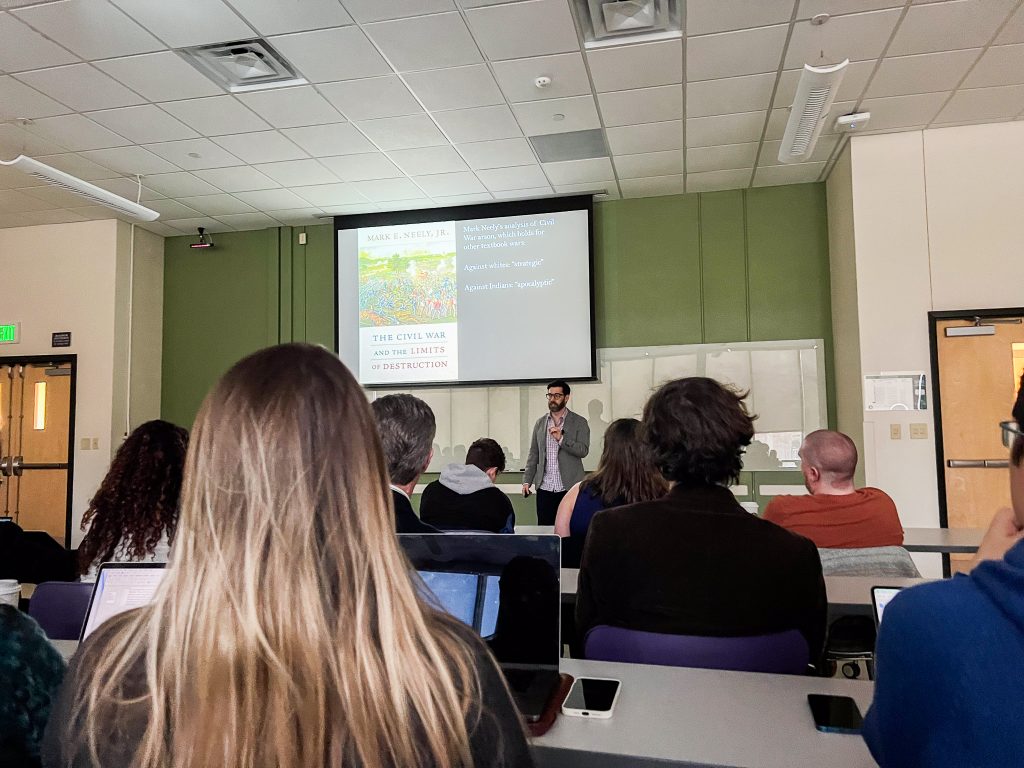An esteemed author and professor of history at Northwestern University gave a lecture highlighting the relationship between wood and settler colonialism in the United States last Thursday.
The 15th-annual Shriber Lecture, titled “Guns, Germs, and Wood: The Landscape of Settler Colonialism,” was held in the Binghamton University Union featuring Daniel Immerwahr, notably recognized for his book “How to Hide an Empire: A History of the Greater United States.” He provided insights surrounding the profound influence of wood on the development of settler societies, particularly in the United States and emphasized wood’s pivotal role in shaping not only the physical landscape, but also the socio-political dynamics of settler colonialism.
Immerwahr’s argument focused on the intrinsic connection between wood and settler colonialism, highlighting how wood’s abundance facilitated the expansion and consolidation of settler societies. He discussed wood’s versatility and affordability, making it a catalyst for rapid construction enabling settlers to establish thriving communities across North America.
“One is that wood makes it really easy and cheap to build,” Immerwahr said. “Wood makes construction easy, far easier in North America than it was at similar times in Europe. At the same time, a wooden environment turns out to be really easy and cheap to destroy and if you think about it, building and destroying — construction and destruction — are the two constitutive acts of settler colonialism.”
During the talk, he described how settlers would use wood from oak and beech trees to build fences and structures like log cabins and frame houses, which played a crucial role in the country’s early development. He also touched upon the flammability of wooden buildings and the challenges they posed — especially in cities like Chicago, which experienced multiple fires due to its predominantly wooden infrastructure.
Immerwahr serves as the Bergen Evans Professor in the Humanities at Northwestern’s history department, and he authored the prize-winning book “Thinking Small: The United States and the Lore of Community Development,” which came out in 2015. His most recent book, a national bestseller, won the Robert H. Farrell Prize for Distinguished Scholarship in the history of United States foreign relations. It appeared on several best books lists in 2019, including The Daily Telegraph, NPR, The New York Times, Smithsonian Magazine, The Chicago Tribune, and The Paris Review.
Using cultural symbols like the log cabin — which politicians sometimes used to emphasize their humble origins and democratic values — Immerwahr highlighted the connection between settlers and wood. He said that an 1856 Walt Whitman poem, “Song of the Broad-Axe,” compares chopping down trees with creating the “shapes of democracy.”
“The kind of identification between wood and frontier life is frequent, and it comes sort of most acutely when William Henry Harrison is elected president in 1840 on a myth — a false myth has turned out not to be true at all,” Immerwahr said. “He’s born in the governor’s mansion, but he insists that he is a log cabin guy, and it is actually not a bad way to get elected president in 1840 to insist that you come from a log cabin … and that kind of becomes a sort of frequent claim of politicians as a way to emphasize their humble origins. Their participation in democratic life is to just clarify how closely they are affiliated or attached to wood.”
The lecture focused on the multifaceted nature of settler colonialism and its enduring legacy. The juxtaposition of wood as both a tool of construction and destruction highlighted the complex dynamics of power and control in colonial encounters.
Diane Sommerville, a professor in the history department, said Immerwahr’s research informs understanding of current environmental challenges.
“I think that [Immerwahr] is very concerned about the environment today,” Somerville said. “He’s asking questions about climate change and our environment, and that’s helping to direct him to the past for answers about the future.”
A Q&A session was held after the lecture, when attendees asked questions ranging from whether Europeans learned from indigenous forestry practices to initial settler reactions to encountering swampy environments . Immerwahr left the audience with a take-home message — ”The United States, a country that accepts no limits, and courts catastrophe because it loves freedom.” As attendees departed, they were left with newfound knowledge on the legacy of wood in shaping the contours of our collective past and present.
“As someone who isn’t a ‘historian,’ when I usually think of the linkage between materialistic goods and the investment of colonial powers, I think about products like sugar or tobacco,” Robert Rose, a sophomore majoring in philosophy, politics and law, wrote. “I never really thought that trees could have also been so influential in this regard.”



